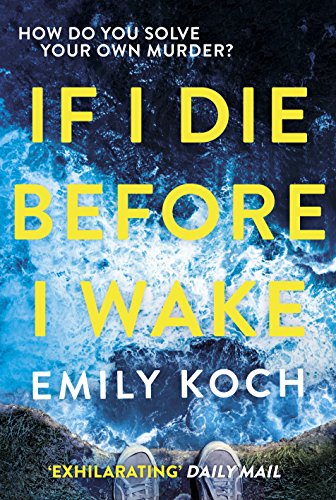 Easing a reader into the viewpoint of a protagonist is every writer’s greatest magic trick. Emily Koch managed something remarkable with her debut novel, enclosing us in the mind of a man suffering from undiagnosed locked in syndrome.
Easing a reader into the viewpoint of a protagonist is every writer’s greatest magic trick. Emily Koch managed something remarkable with her debut novel, enclosing us in the mind of a man suffering from undiagnosed locked in syndrome.
Unable to move or speak, Alex lies in his hospital bed, wishing he could let his friends, family and medical attendees know that he’s aware of everything that happens around him, that he feels pain, hunger and pleasure, and hears and smells each person who visits. From their point of view, he’s in a vegetative state, and the kindest thing to do might be to let him slip away.
More than a year into his ordeal, he wants nothing more than to die. But something isn’t quite right. Alex knows a climbing accident led him to hospitalisation. He was an experienced climber with confidence in his equipment, so what went wrong?
A man that Alex has named Quiet Doc sometimes comes and stands by Alex’s bed and says nothing, disconcerting Alex further.
Worse than that, his girlfriend Bea, who talks to his body as though writing a journal, mentions that she keeps feeling like someone is following her, and is receiving weird phone calls when no one speaks, but she recognises something about the breathing. “something about the way they breathe down the line … seems familiar.”
For a long time, Alex remains unfazed by this. “’Don’t worry,’ I would have said. ‘Why would anyone be watching you?’”
But as Bea’s anxiety grows, so does Alex’s own frustration with his inability to keep her safe. And then he discovers that the police are taking an interest in his case again, and that they’re no longer sure it was an accident.
By drawing on Alex’s experiences as an investigative journalist, Koch is able to sift through and highlight possibilities without the process seeming expositive. It keeps the pace moving rapidly, as Alex’s mind races to find out what happened to his body.
Delivering clues from the fragments Alex overhears, remembers and occasionally glimpses through his parted eyelids equips Koch to stream tension through the novel. Alex, fortunately, is a mostly pleasant, genuine bloke to spend time with, and it always seems worth reading a few pages more to find out what more you can glean. Before you know it, eighty pages will have passed.
In a novel where the hero is immobile a less skilful writer might have resorted to building a narrative around flashbacks and memories, but Koch keeps us very much in the present. By focusing on textures, temperatures and smells, Koch breathes life into each scene, helping us to identify each unseen visitor simply through the aromas they carry with them: Alex’s sister Philippa’s Chanel No 5, his dad’s soap and leather smell, Bea’s citrus shampoo, and later, the cloying vanilla scent that suggests she might be moving on with her life. Alex may be physically trapped, but he’s alert, interested and full of life. As the police investigation carries on beyond the hospital, Alex mentally goes through his own journalistic processes, examining every clue he’s gathered and trying to work out who might want to hurt him.
For me, however, it’s the sections on Alex’s daily life that had me enthralled – all the mundanity of mostly painful practices he endures as nurses and doctors work to keep him alive – “the worst things is the suctioning – once every few hours, day and night.”
Then there’s the routine rearrangement of his body to avoid bed sores, the casual humiliation of student doctor rounds, the night-long tube feeds, the cheery janitor who sings as he cleans, the motherly nurse, Pauline, who smells of marzipan, and the grumpy nurse, Connie, “my least favourite member of staff on the ward”, “who always smelled of her favourite snack.” These details serve to build up a world and make it real. As small and limited as the space Alex inhabits is, it’s wonderfully rich in minutiae.
Though categorised as crime fiction, in many ways this is a book about what it is to be human, what motivates us to fight the odds and how we know when to let go. It’s a book about the complex jigsaw puzzle of friendships and families, and how we, distracted by our own obsessions, hubris, and self-doubt, can occasionally miss the most important pieces that make up that puzzle. An exhilarating debut.
If I Die Before I Wake by Emily Koch is published by Harvill Secker and is available to buy from Amazon.
Seen or read anything interesting recently? I’d love to know. I’m always happy to receive reviews of books, art, theatre and film. To submit or suggest a review, please send an email to judydarley(at)iCloud.com.
